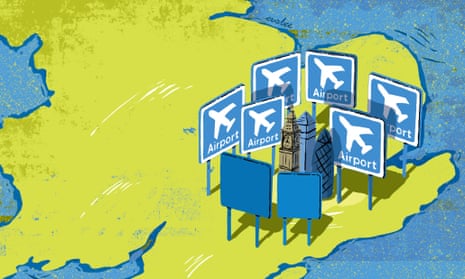Government inquiries are Britain’s bullfights. They are expensive, ritualised, interminable and the cause of lavish corporate expenditure. They all have the same ending: a man in a suit pirouetting over a pile of bleeding meat.
The bleeding meat of Wednesday’s Davies report is London’s environment, apparently in need of yet more air, noise and traffic pollution at levels that should be unthinkable within the built-up area of a 21st-century metropolis.
Howard Davies was asked in 2012 a specific question, how to allow Britain to “maintain its position as Europe’s most important aviation hub”. He was not asked what made sense for the citizens of London, or for their environment, or for balanced growth in the rest of Britain. He duly gave a predictable answer: do what those running the biggest existing airport, Heathrow, want and make it even bigger.
The report admittedly does this job with some panache, albeit with the same fantasy externals that came with the Olympics legacy in 2012. A new runway will reportedly generate £147bn “for Britain”, or elsewhere £211bn. Why quibble? Why not say a trillion? Some economist was presumably paid for this rubbish.
More seriously, Davies had somehow to get David Cameron off the hook of his 2009 pledge that an expanded Heathrow would be over his dead body. Cameron even planted a tree to prove it, and foolishly supported HS2 as a “pro-rail” alternative. He probably hoped that in time people would treat this as a youthful peccadillo, like his joining the Bullingdon Club.
This meant that, while Davies could have rehashed the BAA/BA proposal for a bigger Heathrow in a matter of weeks, he had to delay his report until after this year’s spring election. As party to such cynicism he inevitably appears a ministerial poodle.
Even so, Whitehall spin is that “ministers are ready to ignore the report” and that “no decision will be taken” until September. By prime minister’s questions in the House of Commons today September had already become the year’s end.
Davies states that London airports are “at capacity”, or will be by 2030 – or perhaps by 2040. He makes no attempt at judging what should be the balance between such a “predict and provide” approach to airport investment and any other infrastructure priorities. London’s motorways are also “at capacity”. So are its houses and schools.
This is essentially a market for leisure, for tourists and private travellers. Three-quarters of London’s airline customers (and two thirds of Heathrow’s) are not the business heroes of the growth economy so dear to Davies’s concern. Indeed, I am told that roughly half so-called business trips are perks. Should public money and pollution be devoted to satisfying this (mostly outbound) demand? It is subsidising the balance of payments deficit.
Nor does Davies resolve – he was not asked to – the balance of essential and nonessential air travel in relation to the productive economy. At one point he even claims blandly that a bigger Heathrow means “higher levels of life satisfaction, mental health and happiness”. The line should win some lobbyist a bonus.
The report salves its mercantile conscience by upping the environmental policing of a new Heathrow. It is right to end early morning flights. There is much to be done in reducing landing noise by regulating pilot behaviour and fuel consumption. But the gestures towards local consultation and compensation are just that. A legal commitment that there will be “no fourth runway” is hilarious, when Davies himself is breaking a raft of identical previous promises.
On the alternatives to a new runway, the report is unnecessarily dismissive of the ingenious “stretched” northern Heathrow option, because of its more limited capacity. It had real environmental gains, its backers plausibly arguing it would reduce even Heathrow’s current noise footprint. I suspect it was thrown out because BAA/BA did not like it.
Davies’s case against Gatwick is ostensibly powerful, assuming no government dares order airlines which airport to use. But with tourism booming and Gatwick approaching capacity, what is the medium-term intention? Is it to expand Heathrow primarily for the leisure trade? Davies implies that Gatwick might still expand in the future. If so, why not now? It would be quicker.
There remains the ghost at this banquet. At one point Davies writes that “all London’s runways (except Stansted) will be full by 2040”. So what of Stansted? After Cublington, Maplin and other“third London airports” that crashed in the 80s, the answer was Stansted. It would rise from the Essex meadows as a future hub, designed by Lord Foster and equidistant between London’s silicon roundabout and Cambridgeshire’s silicon fen. As recently as 2003, the air transport white paper agreed, and in 2008 BAA submitted plans for a second Stansted runway and capacity rising to Heathrow’s level.
This admirably sensible proposal fell foul of a government decision to remove Stansted from BAA ownership, leaving the company to put all its eggs (and thus Davies’s) in its Heathrow basket. Spurned by fickle lovers, Stansted’s runways stand half-employed. Yet it was the outcome of the prequel to the Davies report. It is now an Olympic stadium, its rail link abject, its glory gone. Like the proverbial parrot, it is dead, expired, defunct, no more. What a waste.
The Davies report answers too limited a question. It was prepared in the absence of any national airports plan, let alone a wider transport one. Network Rail’s investment programme of £38bn has crashed, yet the Treasury wants to blow £70bn on a single high-speed train. Britain’s crammed road network must be the biggest obstacle to its economic growth, yet that too is butchered. We are now told the leisure travel industry needs a £24bn new runway crammed into the most overheated industrial zone in Europe, west London’s M4 corridor.
Planning is not about meekly following demand. It is about the coherent use of incentives and public money to balance the national economy. Government policy is to let London rip. Davies agrees. The rest of Britain is supposed to grow from Heathrow’s “trickle-down”. Even the most ardent neoliberal knows this cannot be.
All oligopolies, such as air travel, need regulating and planning. Meanwhile Cameron is clearly stalling. I wonder when we get the Davies sequel. I might put a side bet on Stansted.

